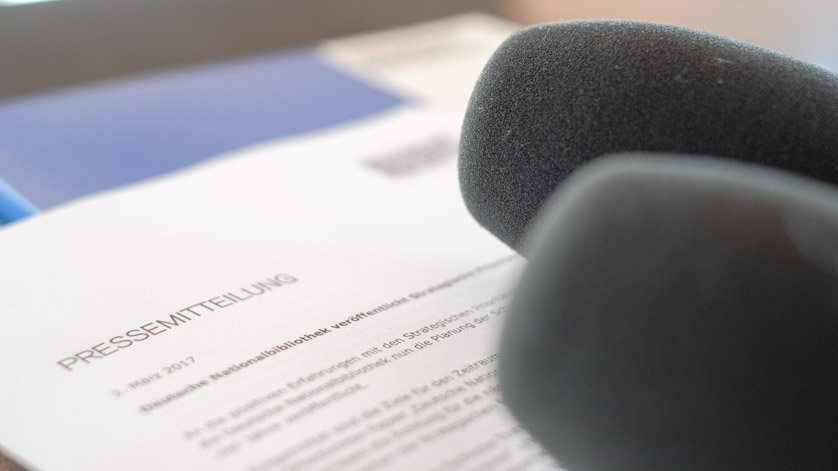Library – Culture – Politics

Press release: 16.8.2018
Library – Culture – Politics:
The history of the Deutsche Bücherei from the German Empire to 1990
Authors Sören Flachowsky and Christian Rau in conversation with Wolfgang Niess
German National Library in Leipzig, 22 August 2018, 19:00
German National Library in Frankfurt am Main, 23 August 2018, 19:00
An anniversary is a good opportunity to reflect on the past. The German National Library has now been in existence for 100 years, a good reason for it to commission an extensive study on the history of the founding organisation. The volumes “Zeughaus für die Schwerter des Geistes” (“Armoury for the Swords of the Intellect”) and “‘Nationalbibliothek’ im geteilten Land” (“‘National Library’ in a Divided Country”), published by Wallstein Verlag, now close a gap in the historiography of the Deutsche Bücherei.
What scope for action did the library have under the Nazi and SED regimes? The authors examine the interaction between library work and politics, science and business. The foundation of the Deutsche Bibliothek in Frankfurt am Main in 1946 directly enmeshed the Deutsche Bücherei in the conflicts of the Cold War. In 1990, the Deutsche Bücherei and the Deutsche Bibliothek merged to form the present-day Deutsche Nationalbibliothek – the German National Library.
"Six years after its 100th anniversary, the German National Library has now succeeded in presenting a comprehensive, independent academic account of its history," say Michael Fernau, Director of the German National Library in Leipzig, and Ute Schwens, Director of the German National Library in Frankfurt am Main.
Dr. Sören Flachowsky from the Department of History at the Humboldt University of Berlin investigates the role of the Deutsche Bücherei during the Nazi era from 1933 to 1945 and traces its development into an effective instrument of Nazi censorship and prohibitionist policy. He has integrated these investigations into an analysis of cultural policy since German imperial times and the foundation of the Deutsche Bücherei.
Dr. Christian Rau from the Institute of Contemporary History in Berlin examines the era of the Soviet occupied zone and the GDR, exploring the complex relationship between the Deutsche Bücherei and the SED regime, the library’s users, and the Deutsche Bibliothek founded as a rival institution in Frankfurt am Main.
The solid expertise of the Department of History at the Humboldt University of Berlin and the Institute of Contemporary History contributed significantly to the creation of both publications.
The German National Library will be presenting both volumes at events in Leipzig and Frankfurt am Main. In a conversation with the historian and academic journalist Dr. Wolfgang Niess, the authors talk about their extensive research, which took them to the archives of the Holocaust Memorial Museum in Washington and the Russian State Library in Moscow. An exciting insight into the eventful history of the organisation, which is a remarkable reflection of the political extremes of the 20th century and of library policy as academic and cultural policy.
Library – Culture – Politics
The history of the Deutsche Bücherei from the German Empire to 1990
Authors Sören Flachowsky and Christian Rau in conversation with Wolfgang Niess
German National Library in Leipzig, Wednesday 22 August 2018, 19:00
Library – Culture – Politics
The history of the Deutsche Bücherei from the German Empire to 1990
Authors Sören Flachowsky and Christian Rau in conversation with Wolfgang Niess
German National Library in Frankfurt am Main, Thursday 23 August 2018, 19:00
Background
The founding treaty of the Deutsche Bücherei was signed between the Kingdom of Saxony and the Börsenverein der Deutschen Buchhändler zu Leipzig on 3 October 1912. In the west, the establishment of a new German archiving library was initiated in Frankfurt am Main in 1946. The reunification of Germany saw these institutions amalgamated into a Federal institution. In 2006 the legal brief of the library was expanded and it was given a new name: Deutsche Nationalbibliothek (German National Library).
The German National Library is entrusted with the task of collecting all German and German-language publications and sheet music from 1913, plus foreign publications about Germany and translations of German works. Also included are the works of German-speaking emigrants published abroad between 1933 and 1945. The collection is archived, comprehensively documented and bibliographically indexed. Besides offering use of its collections at the Leipzig and Frankfurt sites, the German National Library also provides services for libraries, the book trade and scientific institutions, plus a large number of other individual services via the Internet.
The Leipzig site of the German National Library houses the German Museum of Books and Writing (Deutsches Buch- und Schriftmuseum), the German Music Archive (Deutsches Musikarchiv), the Sammlung Exil-Literatur 1933–1945 and the Anne-Frank-Shoah-Bibliothek; the Frankfurt site also contains the German Exile Archive 1933–1945 (Deutsches Exilarchiv 1933–1945).
Contact person
Michael Fernau
Contact: s.jockel@dnb.de

